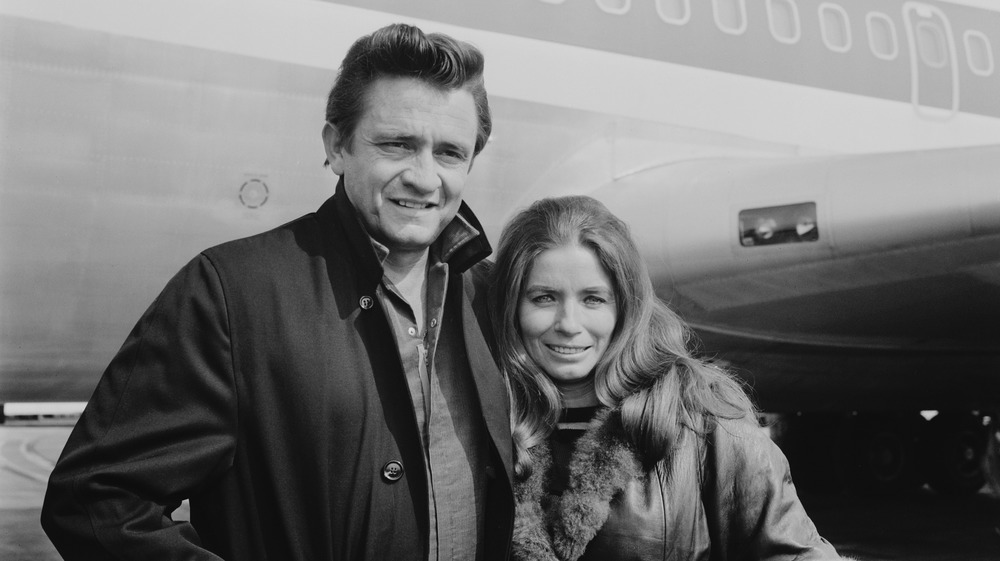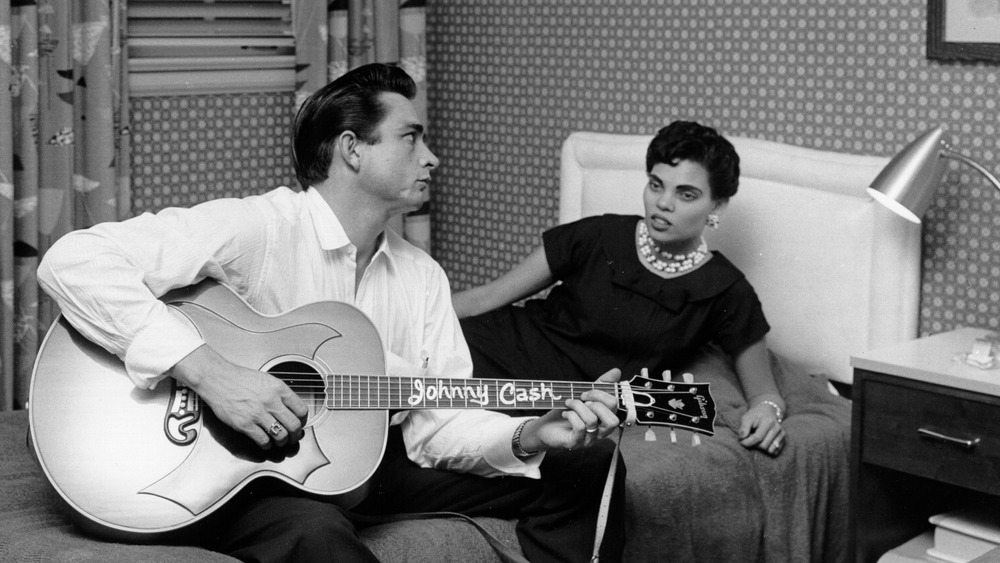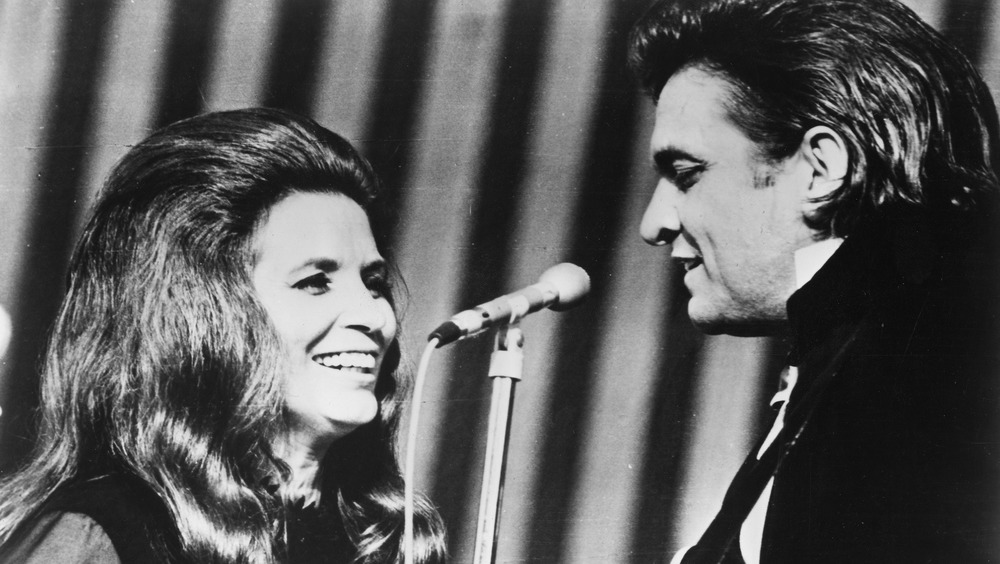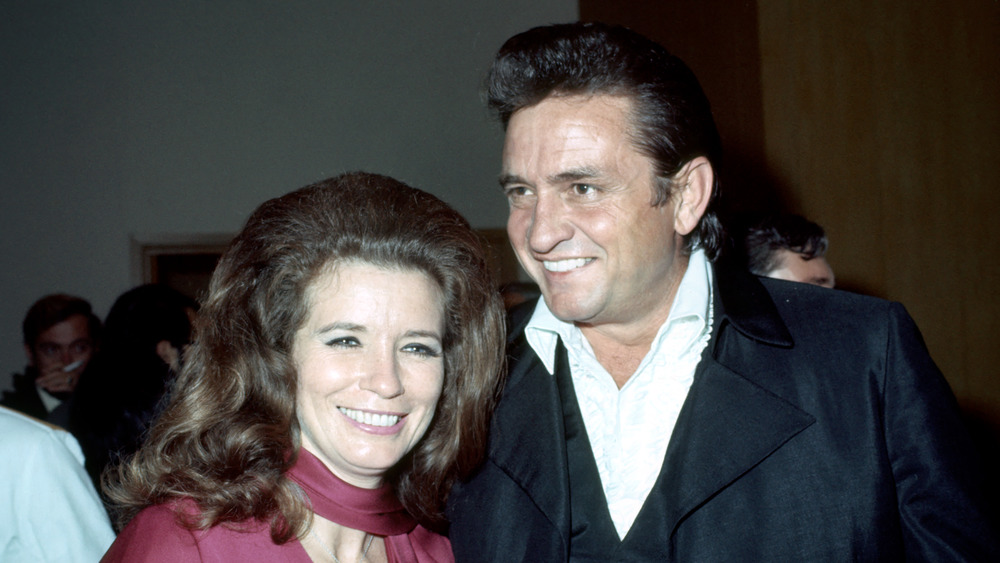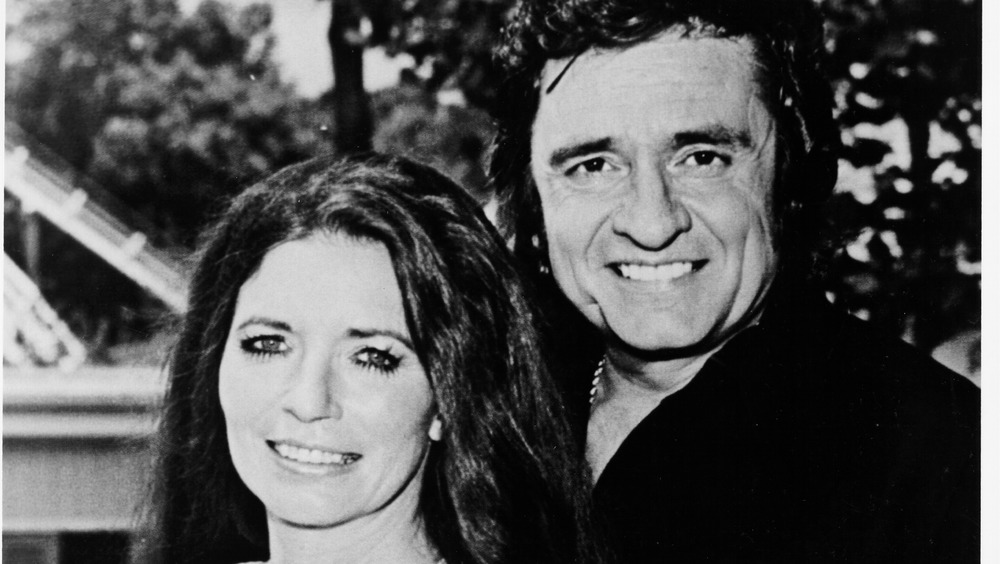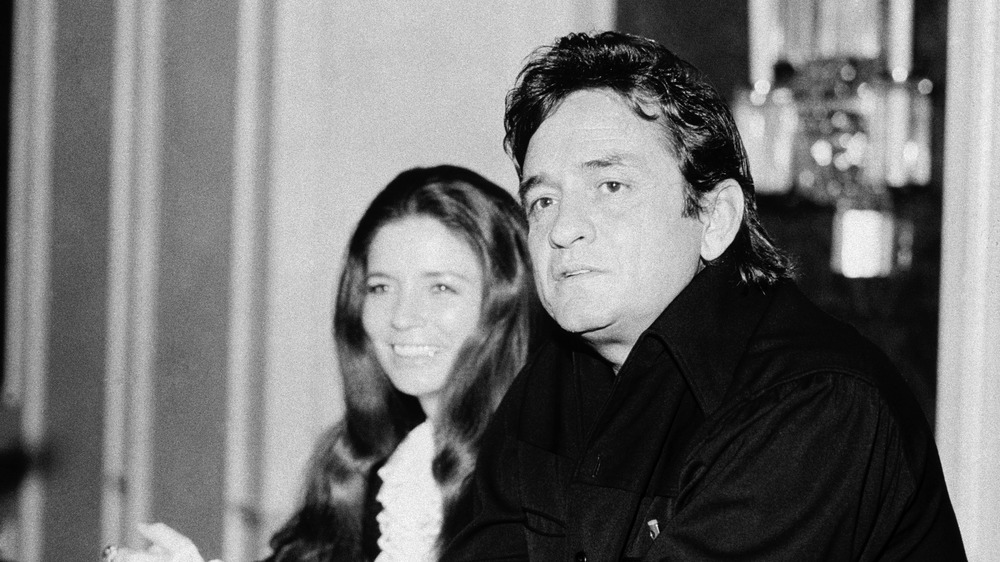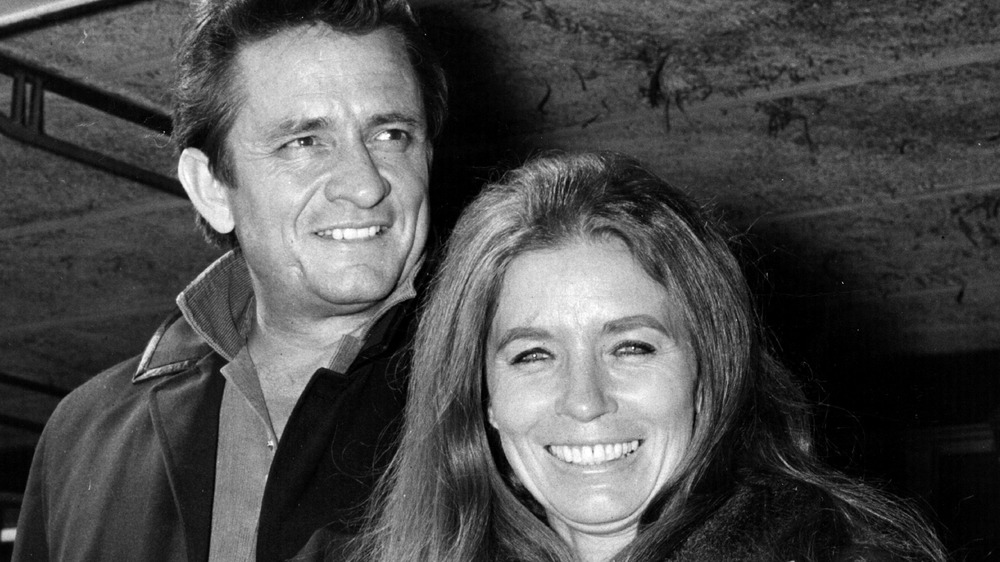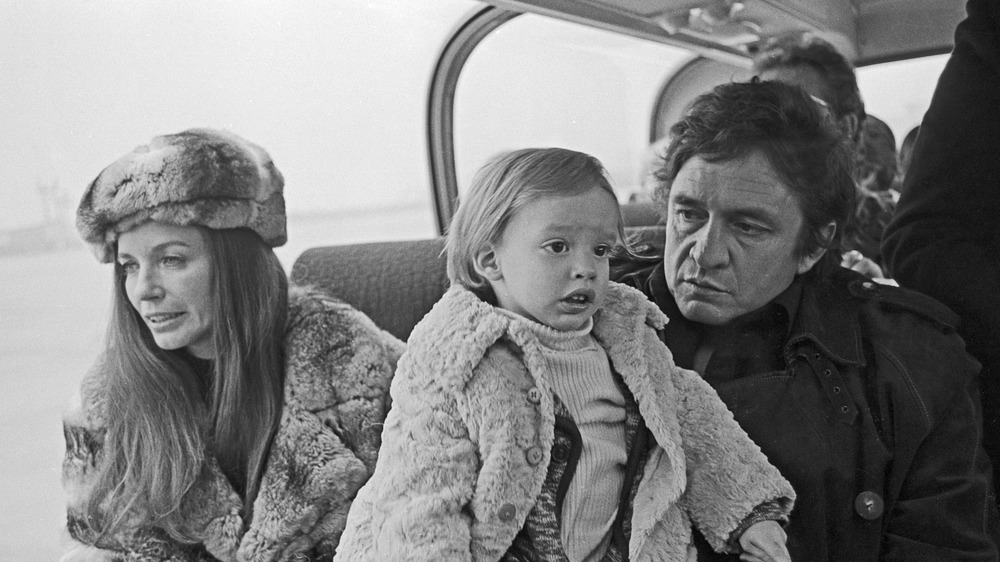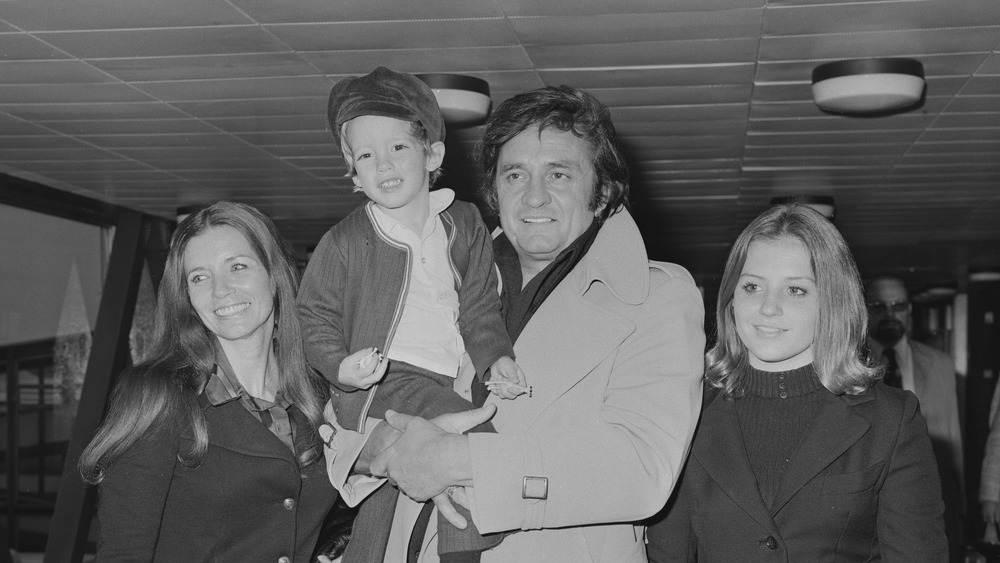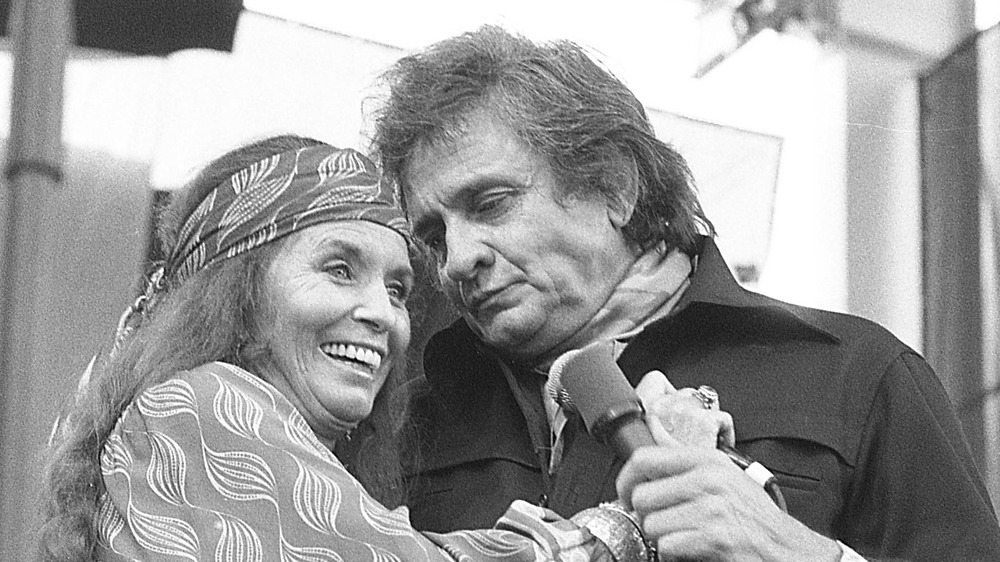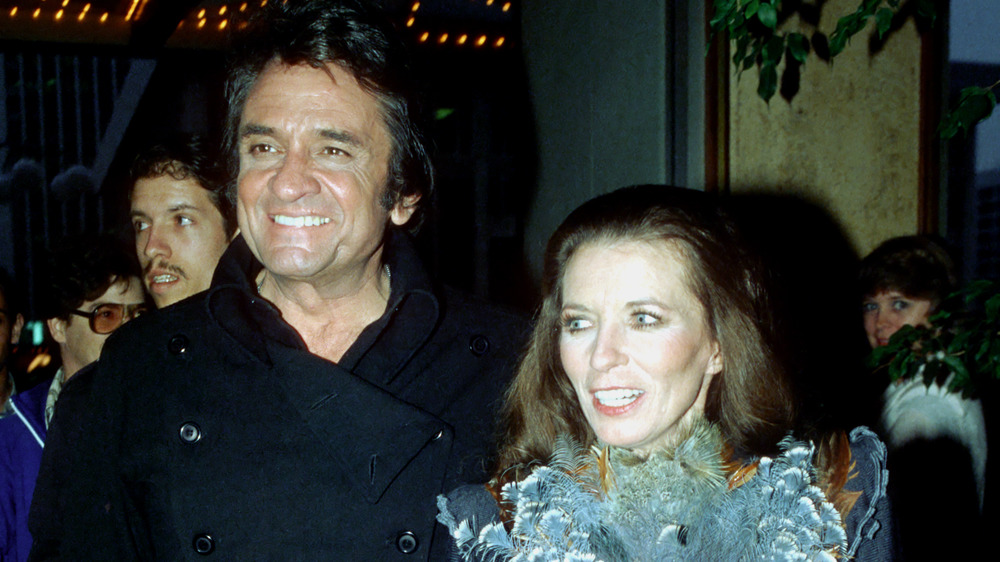Inside Johnny Cash And June Carter Cash's Relationship
In the wake of the Great Depression, a young boy named J.R. spent his days picking cotton and singing hymns in the fields with his family in the government-sponsored colony of Dyess, Arkansas. Around the same time, a young girl named Valerie was singing with her own family in "Mother Maybelle and the Carter Sisters," a folk group that made its debut over the radio waves in Richmond, Virginia.
By 1950, Valerie had become June Carter and J.R. had become Johnny Cash. That year, as NPR recalled, the Carter family got involved in the Grand Ole Opry and moved their act to Nashville, Tennessee. Meanwhile, Cash enlisted in the United States Air Force. As the years rolled on, Cash and Carter each entered marriages and welcomed their first children. Cash sang solemn, gospel-tinted country songs about damnation and salvation, while Carter sang honky-tonk tunes and made crowds laugh with her natural comedy chops.
In many ways, June Carter and Johnny Cash were worlds apart. He was the "man in black," while she was — according to the memoirs of Carter family member Carl McConnell (via Southernmusic.net) — "a natural born clown, if there ever was one." But they had two undeniable things in common that brought them together and kept them there: country music, and the fire of a love that they could not extinguish, no matter how hard they may have tried.
Johnny Cash and June Carter weren't single when they met
In 1965, as History recounted, people in some corners of the Jim Crow South boycotted Johnny Cash. The country music star had been arrested that year for smuggling amphetamines across the Mexican border in his guitar case, but the boycott had nothing to do with drugs; it came instead as a racist backlash to a photo of Cash on the courthouse steps with a woman who some thought was African-American. In reality, she was Vivian Liberto, Cash's Italian-American wife. According to Rolling Stone, Cash and Liberto met when his Air Force career sent him to San Antonio the summer of 1951, exchanged "more than 1,000 letters" while he was overseas in Germany, and got hitched upon his return in 1954.
Meanwhile, in Tennessee, songwriter-actor-comedian June Carter was in the midst of a four-year marriage to honky-tonk singer Carl Smith. The pair married in 1952 and divorced in 1956 — the same year Carter met Cash. In 1957, Carter married Edwin "Rip" Nix, a football player, inventor, and police officer.
All of this would change in 1966 when, a decade after Cash and Carter's first meeting, each of their marriages ended in divorce. But first, rewinding a little...
Sparks flew between Johnny Cash and June Carter right away
"Hello, I'm Johnny Cash and I'm going to marry you someday,” Johnny Cash said upon meeting June Carter, according to Mark Zwonitzer's biography Will You Miss Me When I'm Gone?. July 7, 1956 was a day of firsts for Cash: It was the day he made his debut at the Grand Ole Opry in Nashville, Tennessee, and the day he crossed paths with the love of his life. "I've always wanted to meet you," he reportedly told Carter that day (via MSN), to which she replied, "I feel like I know you already."
Before they officially met, Cash first saw Carter from afar at the Grand Ole Opry years earlier, and according to Rolling Stone, "He liked what he saw then." Carter was already aware of Cash, too, thanks in part to a friend they had in common: the King. As Carter recalled (via Southern Living), "I first heard of [Johnny Cash] through Elvis Presley. Elvis would make me go into these little cafés and listen to John [on the jukebox]."
"I can't remember anything else we talked about, except his eyes," Carter wrote in the liner notes for Cash's 2000 box set Love, God, Murder of their first meeting (via The New York Times). "Those black eyes that shone like agates. I only glanced into them because I believed that I would be drawn into his soul and I would never have been able to walk away.”
'Ring of Fire' sums up the couple's inconvenient love
In a 2000 interview with Rolling Stone, June Carter recounted an early morning drive she took in 1963 — when she was frustrated by the dangerous flames of her love for Johnny Cash but was still married to Rip Nix. It inspired her to take pen to paper. "There is no way to be in that hell, no way to extinguish a flame that burns, burns, burns," she wrote (via Fender). With some help from songwriter Merle Kilgore, those words evolved into the lyrics for "Ring of Fire," which later became Cash's best-selling hit.
"It was not a convenient time for me to fall in love with him – and it wasn't a convenient time for him to fall in love with me," Carter recalled to Rolling Stone. "I was miserable, and it all came to me: I'm falling in love with somebody I have no right to fall in love with."
Cash told Rolling Stone that he knew exactly what — or rather, whom — the song was about. "We were both afraid to say ['I love you'], because we knew what was going to happen: that eventually we were both going to be divorced, and we were going to go through hell," he said. "But the 'ring of fire' was not the hell. That was kind of a sweet fire. The ring of fire that I found myself in with June was the fire of redemption. It cleansed. It made me believe everything was all right, because it felt so good."
Johnny Cash and June Carter were both deeply religious
Johnny Cash's devotion to God shaped his music, his love, and his life. According to The New Yorker, Cash went to church three times a week as a kid, and "throughout the week, he'd sing hymns in the cotton fields." As the Sun Records website recalled, he got face time with record executive Sam Phillips in 1954, but after he performed "mostly gospel songs," Phillips said, "Go home and sin, then come back with a record I can sell."
Still, Cash soon landed a deal with Sun Records and released a few country hits in 1955, before splitting from the label a few years later for a Columbia Records deal. As Country Daily noted, the label "offered him the freedom to record Christian-themed music." Over the decades that followed, Cash released several albums of hymns. "There is a spiritual side to me that goes real deep, but I confess right upfront that I'm the biggest sinner of them all," he said in a 2000 interview for Rolling Stone, before going on to discuss his drug-addled past. "I was separated from God, and I wasn't even trying to call on him. I knew that there was no line of communication. But he came back. And I came back."
"It was really the intervention of June Carter Cash that probably saved his life," Pastor Greg Laurie — who wrote the book Johnny Cash: The Redemption of an American Icon — told Fox News, "and it was her strong faith in God."
June Carter helped Johnny Cash get sober
The June Carter and Johnny Cash love affair began as a brief flicker. Movie director James Mangold, who directed the 2005 biographical film Walk the Line, told The New York Times that Carter had told him "that one night [she and Cash] got together" while "John Cash was married at the time," but she had swiftly ended the affair shortly thereafter.
A lovesick Cash then plummeted down deeper on his drug spiral. His addiction and the erratic behavior that came with it led to the 1966 demise of his marriage to Vivian Liberto, and to his turning-point 1967 arrest on charges including amphetamine possession, which, as History Collection recounted, landed the singer in a county jail in Lafayette, Georgia, getting a firm talking-to from the local sheriff about the direction of his life.
When Cash returned, Carter was there to pick up the pieces. "When we fell in love, she took it upon herself to be responsible for me staying alive," he said in a 2000 Rolling Stone interview. "She'd take my drugs and throw them away, and we'd have a big fight over it... I'd make her promise not to, but she would do it anyway. She'd lie to me. She'd hide my money. She'd do anything. She fought me with everything she had."
Johnny Cash's not-so-private proposal
On February 22, 1968, Johnny Cash and June Carter took the stage in London, Ontario, to perform their 1967 Grammy-winning duet "Jackson," which features the lyric "We got married in a fever." As the song ended, Cash decided to propose to Carter in front of the crowd. "I stopped the show, and I said, 'Will you marry me?' on the microphone," Cash recalled during a 1981 appearance on The Mike Douglas Show. "She said, 'Sing another, sing another, sing another.' I said, 'I'm not going to sing until you answer me. Will you marry me?'... [I] kept going until she finally said 'yes.'"
"It was beautiful... he asked me to marry him in front of 7,000 people," Carter had said earlier during the aforementioned talk show interview. "I would've liked it if he'd have gotten down on his knees and proposed to me... [but] it was a great big production." The lovebirds did get married in a fever, one week later, at the Franklin Methodist Church in Franklin, Kentucky. As ABC's WBKO reported in 2018, the wedding "was recognized ... by the Kentucky Historical Society" and "the dedication marked the start of the Love in Bloom Festival honoring the historic marriage's 50th anniversary."
June Carter and Johnny Cash had one child together
"HE DIDN'T NAME IT SUE," read the headline when Johnny Cash and June Carter welcomed their first and only child together on March 3, 1970. The headline was a joking reference to Cash's 1969 song "A Boy Named Sue," and the child in question was a boy, mercifully and simply named John Carter Cash.
John was the only son in the Carter Cash clan. As noted by Express, Johnny already had four daughters — Roseanne, Kathy, Cindy, and Tara — with his first wife, Vivian Liberto. June had one daughter with each of her ex-husbands: Rebecca "Carlene" Smith, with Carl Smith; and Rosie Nix, with Rip Nix. Most of Cash's and Carter's children — including Roseanne, Carlene, Rosie, Cindy, and John — followed in their parents' footsteps by entering the music business.
"My parents' love for each other lasted throughout their whole life... They accepted each other totally unconditionally," John said of Johnny and June, according to Reuters. "The honest thing is that my parents wanted to help people. That is part of my responsibility, to carry on that legacy."
An orphanage in Jamaica was funded by Johnny Cash and June Carter
In 1973, Johnny Cash and June Carter Cash donated $12,000 to SOS Children's Villages to fully fund the construction of an orphanage in Jamaica, per Billboard. According to the organization's website, the Cashes had a home in Jamaica "near to SOS Children's Village Barrat Town and the couple "visited the village whenever possible." The site goes on to point out that the "Ring of Fire" singer's admiration for the organization began when its Ammersee village was under construction while he was stationed in Germany in the 1950s, and the profits he made off of his 1973 single "The Ballad of Annie Palmer/The Worried Man" all went to the orphanage in Jamaica.
"[Cash] was always keen about the development of the village and what happened to the children here," said the Barrat Town village's co-founder Heinz Simonitsch, according to the SOS Children's Villages International website. "He was genuinely interested in them." As the organization's site notes, up until he died, Cash regularly stopped by the orphanage, "bringing his guitar and singing with the children."
Upon his death, the organization shared that Cash's family requested "friends and fans to donate to SOS Children's Villages USA in his memory."
June Carter and Johnny Cash died just months apart
On May 15, 2003, June Carter died at the Baptist Hospital in Nashville, Tennessee, a week after undergoing heart surgery. Johnny Cash was by her side as she took her final breath. "My Daddy has lost his dearest companion and his soul mate," said Roseanne Cash, Johnny's eldest daughter, at Carter's funeral (via Capital News). "If being a wife were a corporation, June would have been a CEO. It was her most treasured role."
Nearly two months later, on July 5, 2003, Cash took the stage for the last time at the Carter Family Fold in Virginia. "The spirit of June Carter overshadows me tonight with the love she had for me and the love I have for her," he said onstage (via Biography). "We connect somewhere between here and Heaven. She came down for a short visit, I guess, from Heaven, to visit with me tonight to give me courage and inspiration, like she always has... I thank God for June Carter. I love her with all my heart."
Cash died on September 12 of that year — just four months after Carter — due to complications of diabetes.
Johnny Cash wrote the 'greatest love letter' ever
In honor of June Carter's 65th birthday on June 23, 1994, Johnny Cash wrote her a letter that The Independent would later deem "the greatest love letter of all time." Per the outlet, it read, in part: "We read each other's minds... Sometimes we irritate each other a little bit. Maybe sometimes take each other for granted. But once in a while, like today, I meditate on it and realize how lucky I am to share my life with the greatest woman I ever met. You still fascinate and inspire me... [You're] the #1 Earthly reason for my existence."
Six years later, Cash waxed poetic on his marriage to Carter once again. "There's unconditional love there," he told Rolling Stone. "You hear the phrase a lot, but it's real with me and her. She loves me in spite of everything, in spite of myself. She has saved my life more than once. She's always been there with her love, and it has certainly made me forget the pain for a long time, many times. When it gets dark, and everybody's gone home and the lights are turned off, it's just me and her." Not unlike an eternal flame, their love continues to burn, burn, burn all these years later.

